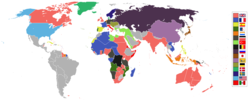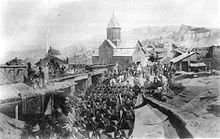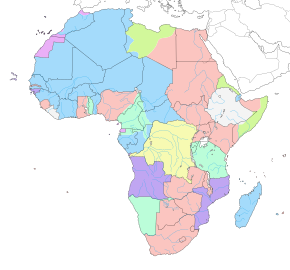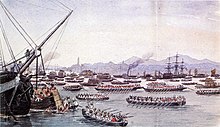Economic explanation of overseas expansion of European nations.
Originally developed by the maverick British economist John Atkinson Hobson (1858-1940) and the Russian Marxist Vladimir I. Lenin (1870-1924).
Imperial expansion resulted from the exhaustion of domestic markets, industrial nations propping up their economies at the expense of those parts of the world which, through military domination, they subjected to economic exploitation.
Also see: colonialism
Source:
David Miller et al., eds, The Blackwell Encyclopaedia of Political Thought (Oxford, 1987)
Etymology and usage
The word imperialism originated from the Latin word imperium,[2] which means supreme power, “sovereignty”, or simply “rule”.[3] It first became common in the current sense in Great Britain during the 1870s, when it was used with a negative connotation.[4] Previously, the term had been used to describe what was perceived as Napoleon III’s attempts at obtaining political support through foreign military interventions.[4] The term was and is mainly applied to Western and Japanese political and economic dominance, especially in Asia and Africa, in the 19th and 20th centuries. Its precise meaning continues to be debated by scholars. Some writers, such as Edward Said, use the term more broadly to describe any system of domination and subordination organised around an imperial core and a periphery.[5] This definition encompasses both nominal empires and neocolonialism.
Colonialism versus imperialism

Imperial powers in 1800[6]

Imperial powers in 1898
The term “imperialism” is often conflated with “colonialism”; however, many scholars have argued that each has its own distinct definition. Imperialism and colonialism have been used in order to describe one’s perceived superiority, domination and influence upon a person or group of people. Robert Young writes that while imperialism operates from the centre, is a state policy and is developed for ideological as well as financial reasons, colonialism is simply the development for settlement or commercial intentions. However, colonialism still includes invasion.[7] Colonialism in modern usage also tends to imply a degree of geographic separation between the colony and the imperial power. Particularly, Edward Said distinguishes the difference between imperialism and colonialism by stating; “imperialism involved ‘the practice, the theory and the attitudes of a dominating metropolitan center ruling a distant territory’, while colonialism refers to the ‘implanting of settlements on a distant territory.’[8] Contiguous land empires such as the Russian or Ottoman have traditionally been excluded from discussions of colonialism, though this is beginning to change, since it is accepted that they also sent populations into the territories they ruled.[8]:116
Imperialism and colonialism both dictate the political and economic advantage over a land and the indigenous populations they control, yet scholars sometimes find it difficult to illustrate the difference between the two.[9]:107 Although imperialism and colonialism focus on the suppression of another, if colonialism refers to the process of a country taking physical control of another, imperialism refers to the political and monetary dominance, either formally or informally. Colonialism is seen to be the architect deciding how to start dominating areas and then imperialism can be seen as creating the idea behind conquest cooperating with colonialism. Colonialism is when the imperial nation begins a conquest over an area and then eventually is able to rule over the areas the previous nation had controlled. Colonialism’s core meaning is the exploitation of the valuable assets and supplies of the nation that was conquered and the conquering nation then gaining the benefits from the spoils of the war.[9]:170–75 The meaning of imperialism is to create an empire, by conquering the other state’s lands and therefore increasing its own dominance. Colonialism is the builder and preserver of the colonial possessions in an area by a population coming from a foreign region.[9]:173–76 Colonialism can completely change the existing social structure, physical structure, and economics of an area; it is not unusual that the characteristics of the conquering peoples are inherited by the conquered indigenous populations.[9]:41 Few colonies remain remote from their mother country. Thus, most will eventually establish a separate nationality or remain under complete control of their mother colony.[10]
The Soviet leader Vladimir Lenin suggested that “imperialism was the highest form of capitalism, claiming that imperialism developed after colonialism, and was distinguished from colonialism by monopoly capitalism”.[8]:116 This idea from Lenin stresses how important new political world order has become in the modern era. Geopolitics now focuses on states becoming major economic players in the market; some states today are viewed as empires due to their political and economic authority over other nations.
European expansion caused the world to be divided by how developed and developing nation are portrayed through the world systems theory. The two main regions are the core and the periphery. The core consists of areas of high income and profit; the periphery is on the opposing side of the spectrum consisting of areas of low income and profit. These critical theories of geo-politics have led to increased discussion of the meaning and impact of imperialism on the modern post-colonial world.

Entrance of the Russian troops in Tiflis, 26 November 1799, by Franz Roubaud, 1886
Age of Imperialism
The Age of Imperialism, a time period beginning around 1760, saw European industrializing nations, engaging in the process of colonizing, influencing, and annexing other parts of the world.[11] 19th century episodes included the “Scramble for Africa.”[12]

Africa, divided into colonies under multiple European empires, c. 1913
In the 1970s British historians John Gallagher (1919–1980) and Ronald Robinson (1920–1999) argued that European leaders rejected the notion that “imperialism” required formal, legal control by one government over a colonial region. Much more important was informal control of independent areas.[13] According to Wm. Roger Louis, “In their view, historians have been mesmerized by formal empire and maps of the world with regions colored red. The bulk of British emigration, trade, and capital went to areas outside the formal British Empire. Key to their thinking is the idea of empire ‘informally if possible and formally if necessary.'”[14] Oron Hale says that Gallagher and Robinson looked at the British involvement in Africa where they “found few capitalists, less capital, and not much pressure from the alleged traditional promoters of colonial expansion. Cabinet decisions to annex or not to annex were made, usually on the basis of political or geopolitical considerations.”[15]:6
Looking at the main empires from 1875 to 1914, there was a mixed record in terms of profitability. At first, planners expected that colonies would provide an excellent captive market for manufactured items. Apart from the Indian subcontinent, this was seldom true. By the 1890s, imperialists saw the economic benefit primarily in the production of inexpensive raw materials to feed the domestic manufacturing sector. Overall, Great Britain did very well in terms of profits from India, especially Mughal Bengal, but not from most of the rest of its empire. The Netherlands did very well in the East Indies. Germany and Italy got very little trade or raw materials from their empires. France did slightly better. The Belgian Congo was notoriously profitable when it was a capitalistic rubber plantation owned and operated by King Leopold II as a private enterprise. However, scandal after scandal regarding very badly mistreated labour led the international community to force the government of Belgium to take it over in 1908, and it became much less profitable. The Philippines cost the United States much more than expected because of military action against rebels.[15]:7–10
Because of the resources made available by imperialism, the world’s economy grew significantly and became much more interconnected in the decades before World War I, making the many imperial powers rich and prosperous.[16]
Europe’s expansion into territorial imperialism was largely focused on economic growth by collecting resources from colonies, in combination with assuming political control by military and political means. The colonization of India in the mid-18th century offers an example of this focus: there, the “British exploited the political weakness of the Mughal state, and, while military activity was important at various times, the economic and administrative incorporation of local elites was also of crucial significance” for the establishment of control over the subcontinent’s resources, markets, and manpower.[17] Although a substantial number of colonies had been designed to provide economic profit and to ship resources to home ports in the 17th and 18th centuries, D. K. Fieldhouse suggests that in the 19th and 20th centuries in places such as Africa and Asia, this idea is not necessarily valid:[18]
Modern empires were not artificially constructed economic machines. The second expansion of Europe was a complex historical process in which political, social and emotional forces in Europe and on the periphery were more influential than calculated imperialism. Individual colonies might serve an economic purpose; collectively no empire had any definable function, economic or otherwise. Empires represented only a particular phase in the ever-changing relationship of Europe with the rest of the world: analogies with industrial systems or investment in real estate were simply misleading.[9]:184
During this time, European merchants had the ability to “roam the high seas and appropriate surpluses from around the world (sometimes peaceably, sometimes violently) and to concentrate them in Europe”.[19]

British assault on Canton during the First Opium War, May 1841
European expansion greatly accelerated in the 19th century. To obtain raw materials, Europe expanded imports from other countries and from the colonies. European industrialists sought raw materials such as dyes, cotton, vegetable oils, and metal ores from overseas. Concurrently, industrialization was quickly making Europe the centre of manufacturing and economic growth, driving resource needs.[20]
Communication became much more advanced during European expansion. With the invention of railroads and telegraphs, it became easier to communicate with other countries and to extend the administrative control of a home nation over its colonies. Steam railroads and steam-driven ocean shipping made possible the fast, cheap transport of massive amounts of goods to and form colonies.[20]
Along with advancements in communication, Europe also continued to advance in military technology. European chemists made new explosives that made artillery much more deadly. By the 1880s, the machine gun had become a reliable battlefield weapon. This technology gave European armies an advantage over their opponents, as armies in less-developed countries were still fighting with arrows, swords, and leather shields (e.g. the Zulus in Southern Africa during the Anglo-Zulu War of 1879).[20] Some exceptions of armies that managed to get nearly on par with the European expeditions and standards include the Ethiopian armies at the Battle of Adwa, and the Japanese Imperial Army of Japan, but these still relied heavily on weapons imported from Europe and often on European military advisors.

This web site is really a walk-through for all of the info you wanted about this and didn’t know who to ask. Glimpse here, and you’ll definitely discover it.